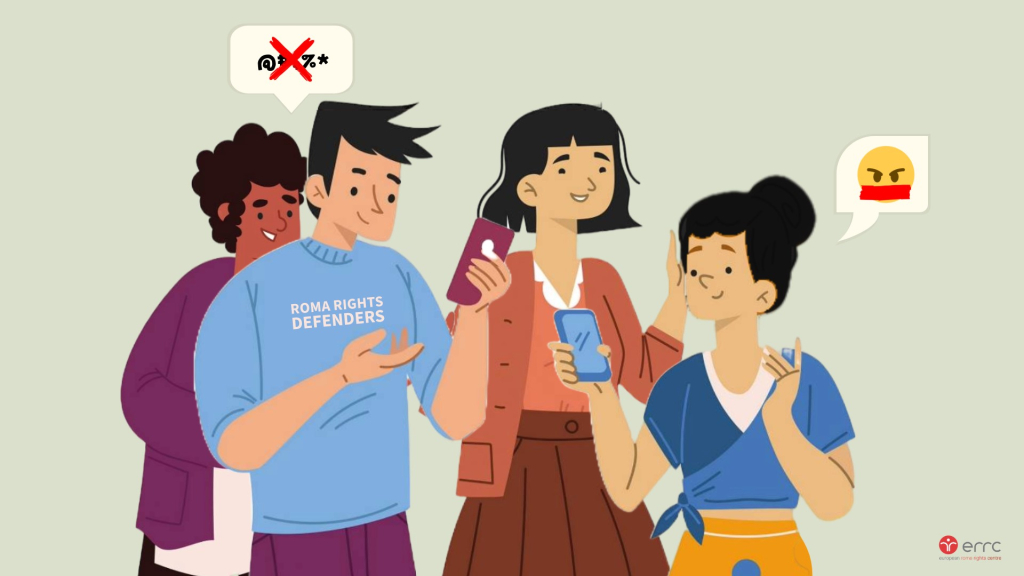November 26, 2024

Brussels, November 26, 2024: In a new ERRC report, young Roma rights defenders raise the alarm about the amount of online anti-Roma hate content and outline what needs to be done to combat and ultimately end online antigypsyism. They warn of the consequences if racial hatred remains unchecked and urge political leaders to do so “Show greater responsibility and accountability to prevent, sanction and combat all forms of anti-Roma hate speech in both traditional and new forms of media.”
In collaboration with the ERRC, volunteer digital activists in several countries have been working since 2020 to monitor and report online hate speech against Roma. The activists believed that anti-Roma hate speech had been overlooked for too long and shared a desire to do something about it and to develop practical and effective measures to combat online hate and its consequences.
Voices against online hate provides vivid accounts of how they captured the most prevalent anti-Roma narratives, how they fared in filing complaints on social media platforms, and how they gathered evidence for legal challenges to online hate speech. The report also expresses their profound and often startling insights into the impact of anti-Roma hate speech. One volunteer said:
“I think the most dangerous thing about hate speech is when several people begin to identify with or even support the call to harm others – be it physically or mentally – and such actions can then ‘inspire’ others to commit illegal acts “The most disturbing content I encountered in my surveillance was the complete dehumanization, the call for the elimination of even children and the promotion of such views.”
Many of the activists were amazed at how widespread and acceptable anti-Roma hatred was, even among political leaders. An activist from Slovakia was surprised “The kind of ‘hotbeds’ where an abundance of hate accumulates. Very often, hate comments could not be found among explicitly racist content.”. As many of the volunteers noted, hate often lurks in unsuspecting places, often on accounts masquerading as fun, humorous, animal-loving spaces online.
The activists pointed out that while much hate speech does not constitute a direct and immediate incitement to violence, the cumulative effect of the daily algorithmic feed of posts, memes and reels that stereotype Roma but pose as Roma is large “harmless fun” represents a real danger. It undermines any sense of empathy and solidarity with Roma and tacitly allows the extreme to become mainstream.
Many felt empowered by their actions and the feeling that from now on hatred would not go unpunished. They were enthusiastic about the proactive, anti-racist and innovative aspects of their campaigns, which combined legal challenges with broad citizen action. As Maya put it “It is better to respond in as many ways as possible because the seriousness of hate speech needs to be better understood and that there should be ‘zero tolerance’ for violence and racism.”
With a view to sustainable solutions, activists emphasized the need for a continued campaign against all forms of racism and violence and to engage in lively public debate and discussion. Longer term, they call for critical digital literacy education to encourage what one activist called “foresight” among young people in a time of instantaneous reaction and coordinated hate. They emphasize that isolating hate speech requires greater investment in education that is explicitly anti-racist and promotes civic responsibility to strengthen young people’s capacity for empathy and solidarity.
The activists insist this is not a “Roma problem” but a societal problem, and called on political leaders, tech companies and media platforms to repair the damage done and show greater responsibility and accountability to counter anti-Roma hate online and to prevent. They call for an urgent dialogue between activists, experts and policymakers that will lead to direct action to combat digital antigypsyism in a strategic, collaborative and effective way.
The report, Voices against online hate: Roma rights defenders in their own words is available for download here.
For further information or to arrange an interview contact:
Jonathan Lee
Director of Advocacy and Communications
European Center for Roma Rights
jonathan.lee@errc.org
+32 49 288 7679
